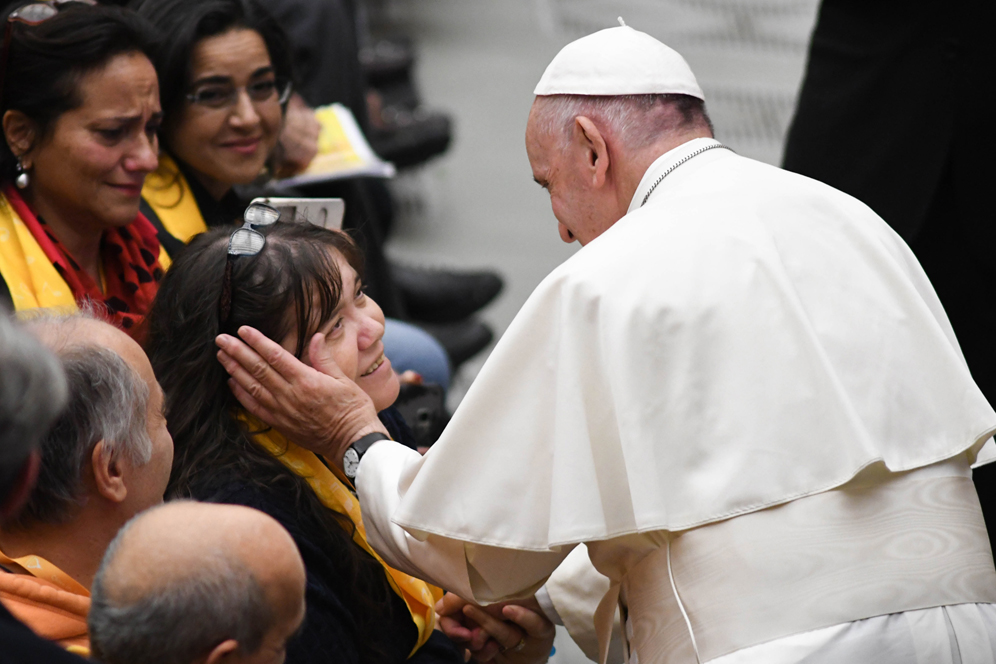WORLD DAY OF THE SICK
The mentality of gift is the antidote to “the culture of waste and indifference”, following the example of Saint Mother Teresa, “a model of charity” for the poor and sick, writes the Pope in his Message for the upcoming World Day of the Sick, scheduled to take place with a solemn celebration in Calcutta on February 11. Life is God’s gift, it’s not “private property”, the Pope warns, conveying his “gratitude” to volunteers and urging Catholic healthcare institutions to reject the logic of business and profit at any price

Life is a gift from God, it’s not “private property.” In his message for the World Day of Sick, that will be celebrated with a solemn ceremony in Calcutta on February 11, the Pope identifies in the mentality of gift the antidote to “the culture of waste and indifference”, taking the figure of Saint Mother Teresa as a “model” of charity for the poor and sick. The Pope expresses his “gratitude” to volunteer workers and calls upon Catholic healthcare institutions to reject the mentality of business and profit at any price.
“Life is a gift from God”: these are the opening words of Bergoglio’s Message. Thus “human life cannot be reduced to a personal possession or private property, especially in the light of medical and biotechnological advances that could tempt us to manipulate the tree of life.” “Caring for the sick requires professionalism, tenderness, straightforward and simple gestures freely given, like a caress that makes others feel loved. Amid today’s culture of waste and indifference – the Pope underlines – “gift” is the category best suited to challenging today’s individualism and social fragmentation, while at the same time promoting new relationships and means of cooperation between peoples and cultures.” “Gift” means more than simply giving presents, Francis points out, “it is the acknowledgement of others, which is the basis of society.”
“Each of us is poor, needy and destitute”,
at every stage of life, is the anthropological premise. Remaining conscious of our limitations, “keeps us humble and spurs us to practice solidarity as an essential virtue in life.” Such an acknowledgement “leads us to act responsibly to promote a good that is both personal and communal.”
“Saint Mother Teresa helps us understand that our only criterion of action must be selfless love for every human being, without distinction of language, culture, ethnicity or religion. Her example continues to guide us by opening up horizons of joy and hope for all those in need of understanding and tender love, and especially for those who suffer.”In the year that marks the celebration of the World Day of the Sick in the city of Calcutta, the Pope defines Mother Teresa “a model of charity”, re-presenting the portrait depicted on the occasion of her canonization: “Mother Teresa, in all aspects of her life, was a generous dispenser of divine mercy, making herself available for everyone through her welcome and defence of human life, of those unborn and those abandoned and discarded… She bowed down before those who were spent, left to die on the side of the road, seeing in them their God-given dignity; she made her voice heard before the powers of this world, so that they might recognize their guilt for the crime – the crimes! – of poverty they created. For Mother Teresa, mercy was the ‘salt’ which gave flavour to her work; it was the ‘light’ that shone in the darkness of the many who no longer had tears to shed for their poverty and suffering. Her mission to the urban and existential peripheries remains for us today an eloquent witness to God’s closeness to the poorest of the poor.”
In the central part of his Message for the World Day of the Sick, the Pope expresses his gratitude and offers his encouragement to “all those associations of volunteers committed to the transport and assistance of patients, and all those that organize the donation of blood, tissues and organs.” “Your volunteer work in medical facilities and in homes, which ranges from providing health care to offering spiritual support, is of primary importance”, Francis writes, addressing them directly. “Countless persons who are ill, alone, elderly or frail in mind or body benefit from these services.” “I urge you to continue to be a sign of the Church’s presence in a secularized world.” The Pope thus details the depiction: “A volunteer is a good friend with whom one can share personal thoughts and emotions; by their patient listening, volunteers make it possible for the sick to pass from being passive recipients of care to being active participants in a relationship that can restore hope and inspire openness to further treatment. Volunteer work passes on values, behaviours and ways of living born of a deep desire to be generous. It is also a means of making health care more humane.”
“A spirit of generosity ought especially to inspire Catholic healthcare institutions, whether in the more developed or the poorer areas of our world, since they carry out their activity in the light of the Gospel.”It’s the exhortation written in the final paragraphs of the Message for the World Day of the Sick, in which the Pope reiterates: “Catholic facilities are called to give an example of self-giving, generosity and solidarity in response to the mentality of profit at any price, of giving for the sake of getting, and of exploitation over concern for people.” Hence the invitation ” to promote the culture of generosity and of gift, which is indispensable for overcoming the culture of profit and waste.” ” Catholic healthcare institutions must not fall into the trap of simply running a business; they must be concerned with personal care more than profit”, is the recommendation.